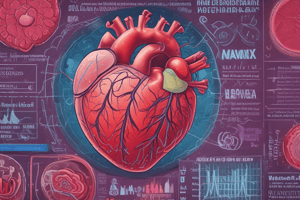Podcast
Questions and Answers
What is the consequence of the coronary arteries being occluded?
What is the consequence of the coronary arteries being occluded?
- Tachycardia and angina
- Hypertension and arrhythmia
- Ischemia and infarction (correct)
- Bradycardia and palpitations
What causes the occlusion of coronary arteries?
What causes the occlusion of coronary arteries?
- Presence of arrhythmias in the heart
- Increased blood pressure in the heart
- Rupture of atherosclerotic plaques forming clots (correct)
- High levels of troponin in the blood
Which ECG changes are characteristic of a STEMI diagnosis?
Which ECG changes are characteristic of a STEMI diagnosis?
- T wave inversions and resolved ST elevation
- Wide Q waves and arrhythmias
- ST elevation and tall T waves (correct)
- Atrial fibrillation and bradycardia
What is the key difference between angina and NSTEMIs?
What is the key difference between angina and NSTEMIs?
When can Q wave changes occur acutely?
When can Q wave changes occur acutely?
What is the primary cause of ischemia?
What is the primary cause of ischemia?
What is the difference between unstable angina and myocardial infarction?
What is the difference between unstable angina and myocardial infarction?
What is the term for chest pain caused by ischemia?
What is the term for chest pain caused by ischemia?
What is the term for the death of heart muscle due to a lack of oxygen?
What is the term for the death of heart muscle due to a lack of oxygen?
What is the difference between NSTEMI and STEMI?
What is the difference between NSTEMI and STEMI?
Flashcards are hidden until you start studying




